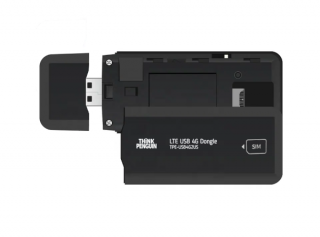USB 4G LTE-Advanced Modem for GNU / Linux (US & Global Markets, TPE-USB4G2US)
Get the best GNU/Linux supported USB 4G LTE-Advanced modem on the market today. With our USB 4G LTE-Advanced Modem, connecting to the Internet is easy. Just plug it in, run your distribution's Mobile Broadband connection wizard, and surf. It's genuinely Penguin friendly with all recent desktop oriented GNU/Linux distributions supported out of the box. Best of all we have two variants of this model to cater to those inside and outside of the United States.
- Experience cellular internet connectivity speeds of up to 150Mbps.
- This USB 4G LTE-Advanced Modem (TPE-USB4G2US) is designed for the US and global markets depending on the variant you purchase and supports connecting to most major US providers (except Verizon).
- Ample documentation: We provide documentation on connecting to the internet for most popular and libre (free) distributions.
- Never worry about support after an upgrade: There are no dependencies on proprietary drivers, NDISWrapper, or other OS-loaded binary blobs.
- Configured to work with major desktop distributions out of the box and our line of free software routers.
- The US edition supports North American cellular providers: AT&T, T-Mobile,
Verizon, Cricket (whitelisting), USCC, Rogers (Canada), and main 4G LTE bands for Telus (Canada).
- The global edition supports all Australian cellular providers, but some better than others. The global edition supports all Telstra & Vodafone 4G bands and 5 of 6 Optus 4G bands. All other Australian providers are mobile virtual network providers that piggyback on one of these three networks.
- US Variant: LTE FDD bands: B2/B4/B5/B12/B13/B14/B66/B71 used by mobile operators in United States, Canada and Latin America.
- LTE Category: CAT 4 (150Mbps Downlink, 50Mbps Uplink).
- Supported on all our current and older routers with a USB port running LibreCMC 1.5.14+
- The best support: Not only do we have lots of documentation for GNU/Linux and free software operating systems, but we provide end-user support so customers who have questions don't have to worry about sub-par or non-existent cellular provider support for GNU/Linux. Have a question? Just email us
- Purchasing a router with your 4G modem? Have a complex configuration you'd like to use such as using the USB 4G modem alongside the router to access the internet from many devices? Or using it with our PenguinVPN service? We now offer upgrade assistance for a small fee. No more worrying about whether or not your software is insecure or out of date. We can help you get it updated to latest release of libreCMC while retaining your selected configuration.
|
Fast shipping: Most customers will receive this item within 1-5 business days when selecting DHL shipping or when selecting our USPS shipping option for those within the US. Most others in populated regions will generally get it within 6-10 business days.
(* large quantities may take longer to deliver)
|
|
Category
|
Specification
|
|
Chipset
|
EC25-AF (US / North America variant)
EG25-G (Global variant)
|
|
Interface Default
|
QMI
|
|
LTE FDD bands
|
US Variant: 2 (1900MHz) / 4 (1700MHz) / 5 (850MHz) / 12 (700MHz) / 13 (780MHz) / 14 (790MHz) / 66 (1900MHz) / 71 (680MHz)
Global Variant: 1 (2100MHz) / 2 (1900MHz) / 3 (1800MHz) / 4 (1700MHz) / 5 (850MHz) / 7 (2600MHz) / 8 (900MHz) / 12 (700MHz) / 13 (780MHz) / 18 (850MHz) / 19 (850MHz) / 20 (800MHz) / 25 (1900MHz) / 26 (850MHz) / 28 (700MHz)
|
|
WCDMA
|
US Variant: 2 (900MHz) / 4 (1800MHz) / 5 (450MHz)
Global Variant: 1 (1900MHz)/ 2 (900MHz) / 4 (850MHz) / 5 (450MHz)/ 6 (2100MHz) / 8 (1800MHz) / 19 (700MHz)
|
|
LTE-TDD
|
Global Variant: 38 (2600MHz) / 39 (1900MHz) / 40 (2300MHz) / 41 (2500MHz)
|
|
GSM
|
Global Variant: 2 (850MHz) / 3 (900MHz) / 5 (1800MHz) / 8 (1900MHz)
|
|
Carrier
|
US Variant: North America: Verizon/AT&T/T-Mobile/U.S. Cellular
US Variant: Canada: Rogers/Telus
|
|
Data transfer speed
|
US Variant: LTE-FDD Data Rate (Mbps): 150 (DL)/ 50 (UL)
US Variant: VDC-HSPA+ Data Rate (Mbps): 42 (DL)/ 5.76 (UL)
US Variant: WCDMA Data Rate (Kbps): 384 (DL)/ 384 (UL)
Gobal Variant: Max 150Mbps (download) / Max 50Mbps (upload)
|
|
SIM Card Slot
|
Nano SIM
|
|
Power
|
USB (no additional power required)
|
|
Plug & Play and Hot-Swapping
|
Yes
|
|
Drivers
|
USB Serial Driver: Windows 7/ 8/ 8.1/ 10, Linux 2.6~5.4, Android 4.x/ 5.x/ 6.x/ 7.x/ 9.x
MBIM: Windows 8/8.1/10, Linux 3.18~5.4
QMI_WWAN Driver: Linux 3.4~5.4
OpenBSD 7.7+ (in MBIM mode)
|
|
Dimensions
|
3 3/14 x 1 7/16 x .5 inches
|
|
Power consumption
|
10μA @Power off
1.0mA @Sleep, Typ.
23.3mA @Idle
|
|
Compatible With
|
Windows 7/ 8/ 8.1/ 10
Android 4.x/ 5.x/ 6.x/ 7.x/ 9.x
Linux 2.6+
|
Have questions?
E-mail support or call us at: 1-888-39-THINK (84465)
|
|
Partial List Of Supported Releases:
Trisquel 9+Parabola GNU/Linux 2019.03.10, 2020.01.18, 2020.01.22, 2020.08.02, 2020.08.03, 2020.09, 2021.08.11, 2022.04, 2024.02Ubuntu 18.04, 18.10, 19.04, 19.10, 20.04, 20.10, 21.04, 21.10, 22.04, 22.10, 23.04, 23.10, 24.04, 24.10, 25.04, 25.10Debian 10, 11, 12, 13Devuan GNU+Linux 3, 4, 5, 6Linux Mint 19.3, 20, 20.1, 20.2, 20.3, 21, 21.1, 21.2, 21.2 Edge, 21.3, 21.3 Edge, 22, 22.1, 22.2, 22.3Fedora 26, 27, 28, 29, 30, 31, 32, 33, 34, 35, 36, 37, 38, 39, 40, 41, 42, 43
|

